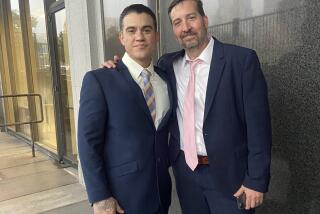Manslaughter Conviction at 2nd Trial Sets Killer of Wife Free
- Share via
Pedro Baez, 58, is going to start a new job as a free man, instead of returning to prison--despite having been convicted of manslaughter this week at his second trial.
At his first trial, Baez was convicted of second-degree murder for having shot his wife, Tomasa, five times.
Now, instead of going back to state prison as he would have in a second-trial plea bargain suggested by his attorney, Baez will begin a new life working as a laborer for a company that has agreed to hire him.
Baez’s story began on Nov. 2, 1981, when he gunned down his wife, in front of several witnesses, across the street from the Chula Vista Police Department headquarters.
Tomasa Baez was 20 years younger than her husband, one of 20 children in a Tijuana family, and according to testimony at Baez’s trial, she duped her husband into marrying her so she could emigrate to the United States.
Shortly after their marriage, the couple bought a home in East San Diego. Defense witnesses testified that the couple separated after buying the house and Tomasa Baez started divorce proceedings.
Baez stood trial in December, 1982, after prosecutors rejected a plea bargain proposal by defense attorney Jerry Blank, who offered to have Baez plead guilty to voluntary manslaughter.
Prosecutors instead sought a first-degree murder conviction. In January, 1983, a jury convicted Baez of second-degree murder and he was sentenced to 17 years to life in state prison. His conviction was followed by five years of appeals that resulted this year in an appellate court ruling reversing the conviction.
The appellate court said Superior Court Judge William T. Low, now retired, erred when he allowed prosecutors to use Baez’s interpreter to question prosecution witnesses. Baez, born in Puerto Rico, does not speak English.
It also ruled that Low erred when he applied the sentencing guidelines contained in Proposition 8, the so-called Victims’ Bill of Rights. The court said that Proposition 8, which became effective on Jan. 1, 1982, could not be applied retroactively in Baez’s case.
On last June 1, the case was sent to Superior Court Judge Artie Henderson for a retrial and Blank again offered to have his client plead guilty to voluntary manslaughter, plus have him spend an additional three years in Folsom Prison before he could be released. According to Blank, Deputy Dist. Atty. Dan Lamborn rejected the plea and said that he would try to again convict Baez again of second-degree murder.
“The prosecution was pretty damned confident that they were going to bring in a second-degree murder conviction,” said Blank. “They said no (to the plea bargain). Their attitude was that this was a first-degree murder case and he got a big break from the first jury and they weren’t going to give him another big break.”
Because the jury at Baez’s first trial acquitted him of first-degree murder, prosecutors were prevented from seeking a conviction on that charge at the second trial.
Lamborn is on vacation and unavailable for comment, but Steve Casey, a spokesman for the district attorney, defended the refusal to accept the second-trial plea bargain.
“We didn’t believe that the plea was fair and adequate,” said Casey.
On July 15, the jury at Baez’s second trial acquitted him of second-degree murder and began deliberating on voluntary and involuntary manslaughter charges. Prosecutors agreed to release Baez on his own recognizance, while the jury decided whether to convict or clear Baez of the manslaughter charges.
On Tuesday, the jury returned a guilty verdict on the voluntary manslaughter charge and Baez was freed.
“The current minimum term for voluntary manslaughter with the use of a gun is five years,” said Blank. “The judge felt that the minimum term was adequate in this case, and, because Mr. Baez had already served 5 1/2 years in Folsom, he was released.” He added that Baez was helped by the fact that he did not have a prior record.
“This was one trial that never made sense to me,” Blank said. “I’m sure that the prosecutor has another view of it. But if you consider that the case was in trial the second time for 6 1/2 weeks, and if you consider the district attorney’s cost, the defense’s cost (the county paid for Baez’s defense) and that witnesses were flown in by both sides from the East Coast and Mexico, it cost the taxpayers at least $125,000. If you count both trials, it probably cost the county $300,000 to try my client twice.”
Blank was also quick to point out that if the prosecution had accepted his plea bargain before the second trial, Baez would still be convicted of voluntary manslaughter and in prison for an additional three years.
Mark Chatfield, a juror at Baez’s second trial, said the jury felt that justice had been done.
“I felt that there was a lot going against him after he married his wife . . . I felt that the wife and her sister had an agenda to acquire the house. . . . He was an easy dupe. He was a lonely guy, apparently gentle and meek. It was a just verdict. He paid his time. It’s not like we let him off. We did convict him of voluntary manslaughter,” said Chatfield.
Casey said that, while prosecutors were not satisfied with the verdict, “that’s why we have trials and juries.”
More to Read
Sign up for Essential California
The most important California stories and recommendations in your inbox every morning.
You may occasionally receive promotional content from the Los Angeles Times.













